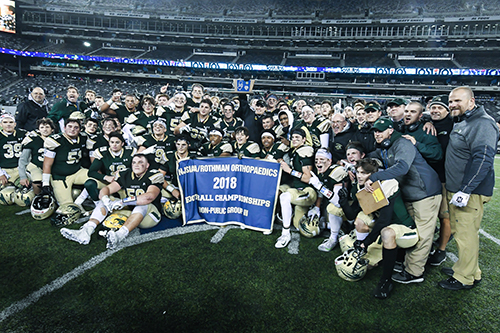ZONING OFFICERS: IT'S A MATTER OF COMPLIANCE
By Herschel P. Rose, Esq.
Throughout our lives, most of us spend very little time thinking about the role of the local municipal zoning officer. We usually go about our days with little awareness that such persons exist in our cities and towns. That is until we get a notice that the shed we just spent months planning for and constructing is not compliant with the local zoning code.
These situations tend to arise where, for instance, a homeowner feels like they need room to house recreational and lawn care equipment and therefore decides to construct a shed on his own accord. In a recent application I heard before a municipal land-use board, an individual came before the Board with a partially constructed two-story shed, which he had been informed was not compliant with the zoning code. The owner thought that because his neighbors had sheds and because there was still a concrete foundation for a shed in his backyard from a previous owner, that he could build a new shed based on some plans that he found online. The problem, as he soon learned, was that his proposed shed was too tall and too close to the neighboring property line. He had also failed to get a building permit or do anything else to investigate whether his new shed was allowed at the spot where he wanted to build it. Nevertheless, he started construction on his shed.
Then, one day, a zoning officer was walking by the homeowner's property and saw the shed being built. Seeing that the shed was rather large and very close to the neighboring property line, the zoning officer investigated. In short, the zoning officer issued the homeowner a warning that the shed was not and would, in its current plan for development, never be up to code. The homeowner, however, halfway through his project, did not want to start over. He, therefore, brought an application before the land-use Board to get specific variances from the zoning code so that he could continue construction on his shed. While that homeowner was eventually permitted to build a shed, he had to tear down the existing structure and create a new shed in conformance with the zoning code and the Board's conditions. We often hear that asking for forgiveness can be easier than asking for permission. Still, in this case, it wound up costing this homeowner much more time and effort to reconstruct a compliant shed than if he had taken the time to look up the code or call his local zoning official to find out what kind of shed would be permitted and what type of shed would be struck down.
When faced with a notice of non-compliance from the zoning officer, we might wonder, why is the municipality picking on me? What did I do besides build a shed on my property? We all know zoning codes are put in place to regulate how things are built and make sure that there is some planning in how our city or town is spread out. Still, apart from those ideas of broad municipal planning, we tend to view compliance with the particulars of the zoning code as more of a nuisance and certainly a hinderance of our freedom to use our property how we wish. Who is this zoning officer to issue me a warning anyway, and what do I do?
The zoning officer is an agent of the municipality and works to enforce the municipality's zoning laws and ordinances. Practically, and as distinguished from an official like a police officer, a zoning officer's role is to ensure broad compliance with the zoning code. The zoning officer should never have the objective of punishing an individual, the role of the zoning officer instead is to attempt to bring development into compliance with the local zoning code. In that role, the zoning officer is charged with inspecting potential violations. The officer can do this, as in the case above, by visual confirmation of a breach if the property is visible from the street or obtaining the landowner's consent if entry is required before inspecting a property. If a landowner refuses entry, a zoning officer could even come back with a warrant authorizing them to enter the property and investigate any potential violations.
However, due to the rate of development in most municipalities in New Jersey, a zoning officer does not usually have time to drive around and investigate each shed, deck, or construction in town for compliance. Consequently, zoning officers tend to rely on complaints received from neighboring property owners to initiate investigations. The identity of these complainants are protected, and a zoning officer must keep the identity of a complainant confidential in the same way that a police officer may be obligated to conceal a confidential informant's identity.
Once the zoning officer observes a violation of the zoning code, the zoning officer becomes an enforcement agent acting on behalf of the municipality. The most common result to a property owner will be an official notice of violation which informs the landowner of the violation and their right to either appeal the determination of violation, seek a hearing before the zoning board to determine if there really is a violation, or seek a variance from the zoning code if they can demonstrate why, despite the violation, they should be allowed to proceed.
If the notice of violation is ignored, or if the offense is so severe that action is required, a zoning officer may also issue a summons to the landowner to answer a complaint in municipal court seeking fines. While a zoning officer is technically permitted to issue a fine for every day that a landowner is not compliant with the code, one fine will usually suffice to rectify the violation.
If the violation involves a simple fix, such as the moving of a fence or small structure, the best solution is usually to fix the condition after receiving notice of violation. Even if fines are issued, landowners often choose just to pay the fine and remediate the situation so that it is in compliance. If, however, the fix is not simple, or a landowner simply believes he or she meets the legal standard for getting a variance from the local zoning ordinance, that person may go before the appropriate land-use board with an application for a variance, a legally excused violation of the zoning code. In order to do this, an applicant must demonstrate exceptional circumstances or reasons why a variance is necessary. Different types of variances will have different standards an applicant must meet and will, therefore, be easier or more challenging to obtain. It is best to consult a land-use attorney when determining whether a variance application is necessary and what kind of variance is required.
While the zoning officer is charged with enforcement of the zoning law, the law recognizes that the officers are not infallible. When you have a disagreement with the zoning officer about their determination or their interpretation of the zoning ordinance, you may appeal the zoning officer's decision or request an interpretive hearing before the appropriate land-use board. The decision by the land-use board, whether it be for an application for a variance, the appeal of a zoning officer's decision, or interpretation of an ordinance is further appealable to the Superior Court. While an individual, in some circumstances, may skip these boards and go right to court, a hearing before these specially designated boards is advised since they tend to be experts in matters of land-use law and because, being made up of members of the local municipality, boards have an idea of the true conditions on the ground and the governing body's plan for that land.
Occasionally, the municipality may face a circumstance where the notice of violation letter will not likely cure the violation and where the municipal fine may not serve as an adequate deterrent to a violator. These would be the more severe circumstances where an individual might be operating a toxic dump or maintaining an illegal parking lot that nets more profit than the amount of the fine. In such cases, the governing body will consult its attorney and may file for what is called injunctive relief – a court-order to cease/remediate all violations on the property. These injunctions are quite rare, due to the expense and effort required on behalf of the municipality to prosecute them. However, if the violation is harming other people or causing a disturbance, the municipality may decide that an injunction is warranted.
Given this brief overview of the processes involved in the realm of land-use law, you might be thinking to yourself, "Great – how do I avoid this?" or "How do I ensure that I never have to take the time and effort to convince a land-use board that my shed is really better off two feet closer to the property line than is permitted?"
The answer is to do your homework before pulling out the shovels! Municipalities in New Jersey almost uniformly post their zoning codes online and have dedicated staff in their zoning offices who are there to answer the public's questions about what will be necessary to construct a shed, put in a pool, build a patio, or to initiate any development of your property. There are also a plethora of planners, engineers, and lawyers who are very familiar with zoning codes and municipal land-use law who can assist in obtaining a variance, request interpretation, or appeal a zoning officer's decision. And again, I reiterate that while asking for forgiveness instead of permission works in some cases, it is far better to find out beforehand that a variance will be necessary to build your shed than find out later that you have to tear down the structure you just spent the last two weeks putting up.
Herschel P. Rose is an attorney at Davison·Eastman·Muñoz·Paone, P.A. in the land-use and municipal law department. He represents applicants and objectors before various land-use boards in New Jersey and serves as the board attorney in several municipalities. He may be reached at [email protected] or 732-462-7170.
Latest posts by admin (see all)
- 2023 JSN Awards Finalists Announced - December 18, 2023
- Sunil Sunder Raj Recaps Day One of State Football Finals With OnNJ (VIDEO) - November 27, 2023
- Mental Health and Exercise: Finding Balance in New Jersey's Fast-Paced Life - November 27, 2023








